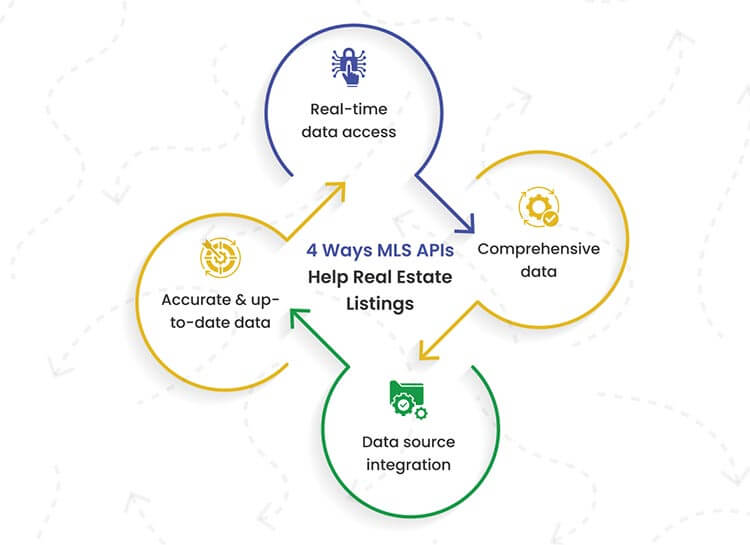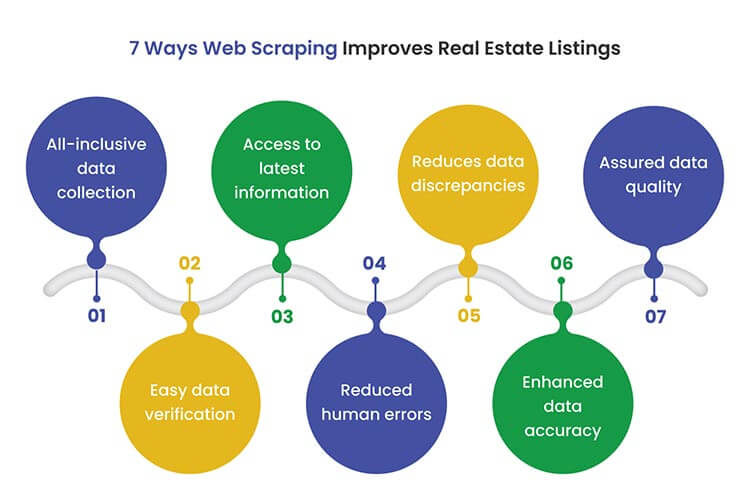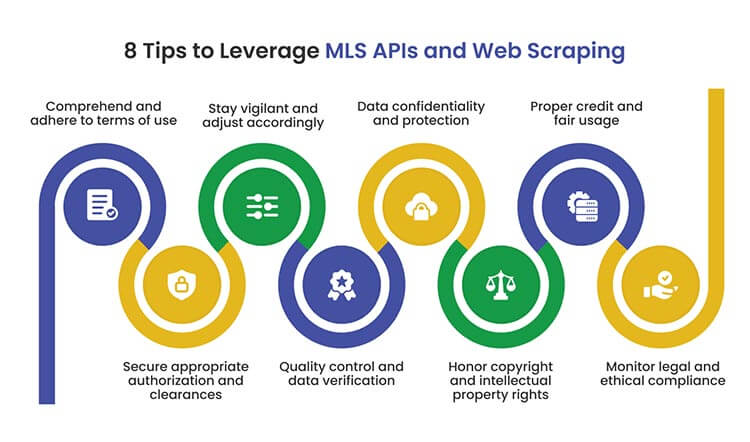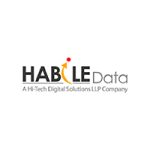The combination of MLS APIs and web scraping empowers real estate portals to seamlessly automate data collection and integration of the latest property information into their databases. It helps them improve the quality of property listings and keep them comprehensive, accurate, and up to date.
Contents
- Real estate listings: data acquisition and quality concerns
- How MLS APIs and web scraping techniques work together?
- How MLS APIs enhance real estate listings accuracy?
- How web scraping improves real estate listings accuracy?
- Best practices for using MLS APIs and web scraping
- Real-life examples of implementing MLS APIs and web scraping
- Future of MLS APIs and web scraping
- Conclusion
The integration of MLS APIs and real estate web scraping enables property portals to improve the accuracy of their listings. By addressing issues related to data scarcity and inconsistency, these portals expand the scope of their offerings. This also streamlines the process of keeping listings current, leading to cost savings and reducing manual efforts. This automation strengthens their ability to meet customers’ needs, giving them a competitive advantage.
Implementing MLS APIs and web scraping needs technical expertise and effective data integration. Handling real-time data updates can be complex, as is scaling these systems as the portal grows.
It is critical to ensure compliance with copyright laws and privacy regulations for web scraping or accessing MLS data. Also, quality control for large volumes of data scraped from varied sources can be challenging. And data must be protected from breaches, making security a significant concern.
In this article, I will walk you through some key questions people have about MLS APIs and real estate web scraping. And why collaborative use with best practices ensures the most accurate listings.
Real estate listings: concerns around data acquisition and quality
Real estate is a growing sector worldwide. It heavily relies on data to fuel transactions, assessments, and market analysis. However, concerns about data collection and quality persist. It includes inaccurate property details, outdated information, and misrepresented features. These issues can impact property valuations, buyer decisions, and market transparency.
One should ensure verification and adopt effective web scraping techniques to gather real estate data. It can help maintain listing integrity and foster trust in the real estate market. Some of the concerns and their consequences include:
Scraping real estate listings
Data in silos: Real estate data often exists in silos. It is scattered across government records, property websites, brokers, and real estate agencies. The diversity and inaccessibility of these sources lead to inconsistencies. This makes data aggregation a challenging process.
Data privacy: Data acquisition in real estate must adhere to stringent privacy laws and regulations. Dealing with sensitive information like homeowners’ details, property value, etc., has privacy concerns that need diligent handling.
Time and cost: Comprehensive data acquisition is a time-consuming and expensive process. Considering the vast amount of data to be collected, collated, and analyzed, acquiring data in real estate can be a formidable task.
Real estate listings demand reliable data collection for accurate, trustworthy listings. Addressing concerns over data quality is crucial for informed property decisions. We captured 28,000 plus customer records from multiple property documents from across six different states/counties. Automated bots and macros were used to fast-track the data collection and entry process that efficiently managed fluctuating and huge volumes of records.
Read full case study »Data quality in real estate listings
Data inaccuracy: Inaccurate or outdated information leads to misleading valuations, poor decision-making, and financial losses for consumers and investors. It can lead to wasted time and frustration for both buyers and sellers.
Incomplete data: Often, listings do not have comprehensive information. Essential details like property age, specific location, legal disputes, etc., might be missing. It causes potential buyers to make decisions based on incomplete information.
Lack of data standardization: It creates challenges when integrating and aggregating data from disparate providers. Inconsistent data can lead to confusion and make it difficult to perform accurate queries or comparisons.
How do MLS APIs and web scraping techniques work together to enhance real estate listing accuracy?
MLS APIs and web scraping techniques complement each other in enhancing real estate listing accuracy. While APIs provide direct access to MLS data, real estate web scraping extracts additional information from disparate data sources. Combining both methods ensures accurate, comprehensive, and up-to-date property details. It improves decision-making and user experience in the real estate market.
Some of the ways it helps the industry include:
Informative and attractive listings: MLS APIs offer essential property information, but it is not always comprehensive. Real estate web scraping enriches the MLS data by extracting additional information such as property descriptions, images, amenities, floor plans, virtual tours, and user reviews. This makes real estate listings more informative and attractive to potential customers.
Easy to validate and verify: MLS data may contain errors, outdated information, or inconsistencies. Real estate web scraping can aid in validating and verifying the MLS data. By cross-referencing information from multiple sources, discrepancies, and inaccuracies are identified and rectified.
Real-time updates: MLS APIs typically offer real-time access to the latest property listings and updates. However, there may be delays or limitations in certain cases. Real estate web scraping complements the MLS data. It monitors real estate websites and platforms for new listings, price changes, or other updates. The collaboration helps to showcase the most recent changes in the market. It offers accurate and timely information to users.
Expanding listing coverage: MLS APIs use primary channels to focus on active listings. However, real estate web scraping identifies unlisted or off-market properties that are not available on the MLS. Adding extra information to your listings expands the coverage and diversity of the listings. This provides a more comprehensive view of the market.
Explore the power of MLS APIs. Enhance the accuracy of your real estate listings.
Speak to our experts »How do MLS APIs enhance the accuracy of real estate listings?
MLS APIs offer multiple benefits to real estate businesses in terms of data accuracy. Constant access to updated property data improves the accuracy of their dataset. It improves their operational efficiency, enhances customer experience, and builds market credibility.
Some of the ways MLS APIs enhance accuracy include:

Provide access to real-time data
- MLS APIs allow real estate portals to connect directly with Multiple Listing Services (MLS) databases.
- This enables the portals to retrieve data in real-time directly from MLS sources. It also ensures that the listings are up-to-date and accurate.
- Property information changes like availability, price adjustments, or property status reflect in real-time.
- Event-based notifications or webhooks allow real estate listing platforms to receive instant updates without continuous polling or scraping.
Gather comprehensive and reliable information
- APIs ensure higher accuracy for real estate listings due to authorized sources and direct data integration.
- Real estate portals use MLS APIs to offer comprehensive and reliable data. This reduces the chances of errors or outdated information.
- Often APIs have their in-built quality check process to validate and verify data before making it available through API.
- This ensures data accuracy by taking care of duplicates, erroneous or outdated data.
Offer access to structured data by direct integration with data source
- API scraping allows direct integration with the authorized data sources. It ensures compatibility between the data source and the receiving system.
- APIs deliver data in structured formats like JSON or XML that allow for seamless integration
- MLS APIs take care of inconsistencies and variations by formatting their datasets to eliminate errors and improve accuracy.
- API scraping provides a more secure integration method as access to the data is controlled and authorized by the API provider
Eliminate manual data entry errors
- MLS APIs automate the process of importing property data into real estate portals.
- This eliminates the need for manual data entry. It reduces the potential for human errors, typos, or data inconsistencies that arise when data is transcribed manually.
- Direct integration ensures the accuracy and consistency of the listings.
How do web scraping techniques improve the accuracy of real estate listings?
With the ability to scrape data from diverse sources beyond the reach of APIs, real estate web scraping contributes to data accuracy in many ways. Aggregating data from multiple sources helps with easy comparison and cross-checking to drive higher data accuracy.
Some of the ways web scraping enhances accuracy include:

Large-scale data collection
- With web scraping, you can efficiently collect large volumes of data as there may not be any usage limits.
- Web scraping allows you to extract data even from websites that may not have an official API or may not expose all the desired data through their API.
- This can be useful if you want to gather more detailed or specific information that is not available through the API endpoints.
- Gathering comprehensive data from various datasets improves the accuracy of your decision-making.
- By aggregating data from various websites, you can gain broader insights. You can identify patterns that are not apparent with limited data sources.
Easy to cross-check and verify
- Web scraping gathers data by extracting information from websites. It includes property listing websites, real estate agencies, forums, social media, and other online sources.
- Data from multiple sources can be used to cross-check and establish data authenticity
Real-time data updates
- Web scraping allows for real-time data extraction from websites.
- Real-time web scraping can be automated using web scraping tools or by programming.
- Scrapers and crawlers scrape data from a webpage at almost the same time as changes occur on the websites
- This means you can access the latest information available on a website, and collect data that is up-to-date and accurate.
Eliminates human errors
- Web scraping automates the data collection process and eliminates human errors that occur during manual data entry.
- Human mistakes such as typos, misinterpretations, or overlooking details can be minimized. It reduces inaccuracies in your data.
Consistent data extraction
- Web scraping tools can be programmed to extract data consistently. It ensures uniformity in the collected information.
- This consistency reduces variations and discrepancies that arise from manual data collection.
Data validation and cleaning
- Web scraping can include data validation and cleaning steps to ensure the quality and accuracy of the collected data.
- Through various techniques such as filtering, data normalization, and removing duplicates/irrelevant information; web scraping improves the accuracy of the final dataset.
Quality control
- Web scraping allows you to define specific data quality criteria and filters during the extraction process.
- You can set rules to exclude irrelevant or low-quality data. This ensures that only accurate and relevant information is collected.
- This helps to maintain data integrity and enhance the accuracy of the collected data.
Best practices for using MLS APIs and web scraping
When using MLS APIs and web scraping for real estate purposes, it is important to follow best practices. It ensures legal and ethical compliance. Adhering to these best practices helps you establish a responsible approach toward using web scraping and MLS APIs for real estate listings.
Here are some best practices to consider:

Understand and comply with terms of service: Ensure that your use of MLS APIs and web scraping aligns with the policies and guidelines of the MLS provider or any website you plan to scrape.
Obtain proper authorization and permissions: Obtain appropriate authorization and permissions from MLS providers, website owners, or relevant authorities before accessing or scraping their data.
Monitor changes and adapt: Regularly monitor MLS APIs and scrape websites for any changes in their data structures, formats, or terms of service. Stay informed and adapt your scraping methods accordingly to ensure continued accuracy and reliability.
Quality assurance and data validation: Implement robust quality assurance processes to ensure the accuracy and integrity of the data you collect.
Data privacy and security: Respect user privacy and handle personal data responsibly. Implement appropriate security measures to protect the data you collect, ensuring its confidentiality and integrity.
Respect copyright and intellectual property: Respect intellectual property rights, copyright laws, and fair use principles. Clearly distinguish between your content and data sourced from MLS APIs or web scraping in your listings or publications.
Attribution and fair use: When utilizing data obtained through web scraping, provide proper attribution to the source or MLS provider.
Monitor legal and ethical considerations: Stay informed about legal and ethical considerations surrounding web scraping, data usage, and MLS APIs. Regularly review and update your practices to align with evolving legal and ethical standards.
Real-life examples of successful implementation of MLS APIs and web scraping
Here are some examples to demonstrate how successful implementation of MLS APIs and web scraping techniques can enhance the accuracy, coverage, and richness of real estate listings, providing valuable information to users and improving their overall experience.
- Zillow: Zillow is a popular online real estate marketplace that utilizes MLS APIs and web scraping to provide users with accurate and comprehensive property listings.
- Redfin: Redfin, a real estate brokerage firm, utilizes MLS APIs and web scraping to gather property data and provide accurate listings to its users.
- RentHop: RentHop is an online platform that connects renters with landlords in major cities. They utilize web scraping to collect data on rental listings from various sources, including property management websites and classifieds.
- AirDNA: AirDNA is a data analytics company that focuses on short-term rental market research, specifically for Airbnb listings. They leverage web scraping techniques to gather data on property listings, occupancy rates, pricing trends, and guest reviews.
Looking to partner with the best for your data collection needs?
Check out this list of top data collection companies »What are the future advancements in MLS APIs and web scraping techniques for real estate listings accuracy?
Several potential future advancements in MLS APIs and web scraping techniques can further enhance real estate listing accuracy. Some future advancements may include:
- Advanced data integration: More seamless integration capabilities between MLS APIs and web scraping tools. This can facilitate an efficient process of combining multiple data sources, leading to more accurate and comprehensive listings.
- Natural language processing (NLP): By applying NLP algorithms to web-scraped data, real estate professionals can gain deeper insights into the characteristics, features, and sentiments associated with properties.
- Image and video analysis: By analyzing images and videos associated with real estate listings, property attributes, conditions, and features can be automatically identified and incorporated into the listings. This can further enrich the accuracy and visual representation of the properties.
- Machine learning and predictive analytics: Machine learning algorithms and predictive analytics can be employed to analyze historical data from MLS APIs and web-scraped sources. This can be particularly useful for real estate professionals and investors in making informed decisions.
Conclusion
The combination of MLS APIs and effective web scraping techniques has revolutionized the accuracy of real estate listings in remarkable ways. Effective web scraping techniques complement MLS APIs by expanding the scope of data collection. By harnessing the power of MLS APIs, real estate professionals can tap into a vast database of up-to-date and reliable property information. While web scraping techniques allow for the extraction and analysis of data from multiple sources. This further enhances the accuracy and depth of real estate listings.
However, since the process is complex it proves beneficial if you choose a reputable outsourcing partner with a proven track record and experience in MLS APIs and web scraping. This will ensure that you maximize the benefits while minimizing potential risks associated with data security, privacy, and compliance.
Transform your real estate listings. Increase precision and quality. Leverage the power of MLS APIs & web scraping.
Get started now »
HabileData is a global provider of data management and business process outsourcing solutions, empowering enterprises with over 25 years of industry expertise. Alongside our core offerings - data processing, digitization, and document management - we’re at the forefront of AI enablement services. We support machine learning initiatives through high-quality data annotation, image labeling, and data aggregation, ensuring AI models are trained with precision and scale. From real estate and ITES to retail and Ecommerce, our content reflects real-world knowledge gained from delivering scalable, human-in-the-loop data services to clients worldwide.






